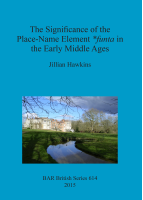Description
*Funta place-names, epitomize the complex network of linguistic and historical intersections in post-Roman Britain. It was a Latin term originally, but adopted and adapted by non-Romans, and used to describe liminal spaces where British and Germanic peoples met. Despite their relevance to a number of key questions about interactions between these cultures, they have never been systematically catalogued and studied before. This research, combining linguistic and archaeological analysis, remedies this. The book provides a detailed gazetteer of sites, extensive analysis and interpretation and, finally, an explanation of language usage and development in the fifth century. It precisely defines the *funta element in place names for the first time. It also discusses the development of British to Old English culture, and provides an insight into peaceful interactions between the different cultures that made up early Anglo-Saxon England, to temper the more traditional characterization of this period as a Dark Age.
REVIEW
‘…a major contribution to the topic, being a remarkably thorough and thought-provoking evaluation of its subject matter.’ Robert Briggs, Journal of The English Place-Name Society 49, 2017











